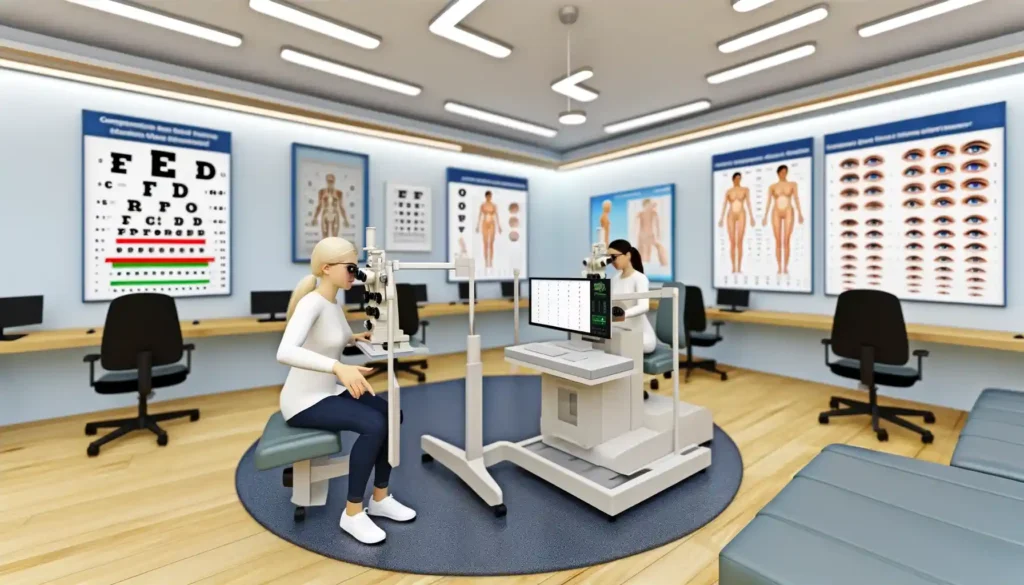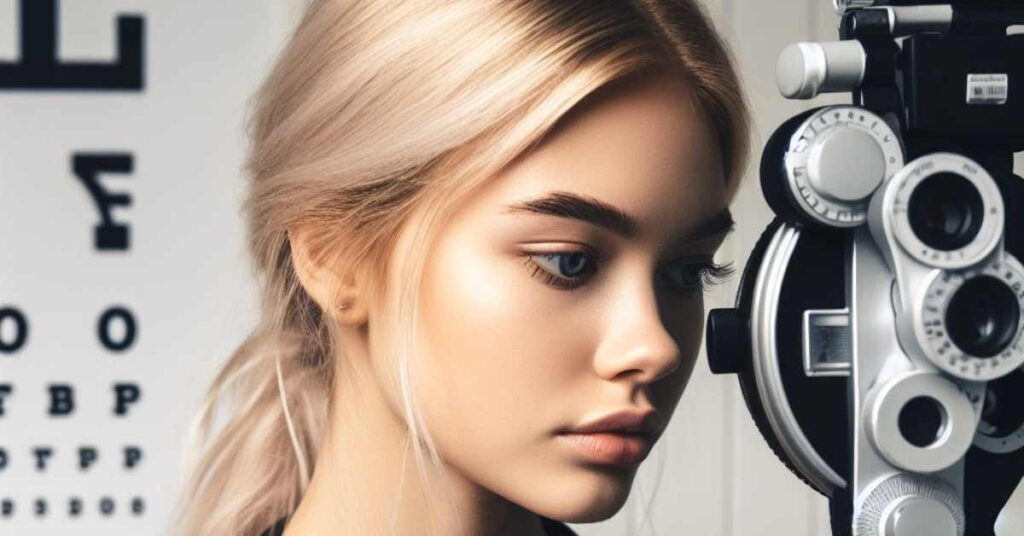Our eyes are not just windows to the world; they are intricate organs that enable us to experience life to the fullest. Yet, in the hustle and bustle of daily life, we often overlook the essential care our eyes need. Preserving your eyesight doesn’t require drastic changes; it’s about adopting simple, yet effective, habits that can make a significant difference. Here are the vision care best practices to help you maintain optimal eye health and preserve your eyesight for years to come:

1. Regular Eye Exercises
Regular eye exercises are essential for maintaining optimal vision and preventing eye strain, especially in today’s digital age. These exercises can help improve focus, reduce eye fatigue, and enhance the flexibility of eye muscles. One popular exercise is the 20-20-20 rule, where you take a 20-second break every 20 minutes of screen time and focus on an object 20 feet away.
Palming is another effective technique; simply rub your palms together to generate heat and gently cup them over your closed eyes without applying pressure. Practice eye exercises to improve focus, reduce eye strain, and enhance flexibility.
Additionally, eye yoga exercises, such as rolling your eyes clockwise and counterclockwise or focusing on a pen tip as you move it closer and farther, can strengthen eye muscles and improve coordination. Incorporating these exercises into your daily routine not only helps alleviate eye strain but also contributes to maintaining clear and comfortable vision.
2. Protective Eyewear:
Wear sunglasses that block harmful UV rays and safety goggles when working with tools or participating in sports.
3. Balanced Diet:
Consume a diet rich in vitamins C and E, zinc, lutein, zeaxanthin, and omega-3 fatty acids to support eye health.
4. Stay Hydrated:
Proper hydration ensures your eyes stay moist, reducing the risk of irritation and dryness.
5. Adequate Sleep:
Aim for 7-8 hours of sleep each night to allow your eyes to rest and rejuvenate.
6. Quit Smoking:
Smoking increases the risk of eye diseases, including macular degeneration and cataracts. Quitting can improve your eye health significantly.
7. Limit Screen Time:
Limiting screen time is crucial in preserving your eyesight in the digital era. Prolonged exposure to screens, be it from computers, smartphones, or tablets, can lead to digital eye strain, characterized by symptoms like dry eyes, blurred vision, headaches, and difficulty focusing. Eye and Vision Care To mitigate these issues, it’s essential to take regular breaks.
Adjust your screen’s brightness and contrast to comfortable levels, and maintain an appropriate viewing distance to reduce eye strain. Moreover, consider using blue light filters on your devices, as they can minimize the impact of harmful blue light emitted by screens.
By being mindful of your screen time and implementing these measures, you can significantly reduce the strain on your eyes, promoting long-term visual health.
8. Proper Lighting:
Ensure your workspace and home are well-lit to reduce eye strain and make reading easier.
9. Manage Chronic Conditions:
Control conditions like diabetes and hypertension, which can impact your vision if left unmanaged.
10. Avoid Rubbing Your Eyes:
Rubbing your eyes can irritate them and increase the risk of infection. Use eye drops if your eyes feel dry or itchy.
11. Clean Your Hands:
Wash your hands frequently to prevent the spread of infections to your eyes.
12. Manage Allergies:
If you suffer from allergies, manage them effectively to prevent itching and redness in your eyes.
13. Contact Lens Care:
Follow proper hygiene and care guidelines for your contact lenses to prevent infections and discomfort.
14. Blink Often:
Blinking helps moisten the eyes, reducing the risk of dryness and irritation.
15. Know Your Family History:
Be aware of your family’s eye health history, as many eye conditions have a genetic component.
16. Stay Active:
Regular physical activity improves blood circulation, benefiting your eyes and overall health.
17. Limit Alcohol Intake:
Excessive alcohol consumption can lead to vision problems. Drink in moderation or abstain.
18. Manage Stress:
Chronic stress can affect your eyesight. Managing stress is not only essential for your overall well-being but also plays a significant role in preserving your eyesight. Chronic stress can lead to various eye problems, such as blurry vision, eye twitching, or even difficulty focusing. When stressed, people often unconsciously strain their eye muscles, leading to discomfort and fatigue.
Engaging in stress-reducing activities such as meditation, yoga, or deep breathing exercises can significantly alleviate these symptoms. Adequate sleep and regular physical activity also contribute to stress reduction. Additionally, taking time for hobbies, spending quality moments with loved ones, and practicing relaxation techniques can help in maintaining both mental peace and the health of your eyes. By managing stress effectively, you not only improve your overall quality of life but also promote the longevity of your eyesight, ensuring clear and comfortable vision for years to come.
19. Educate Yourself:
Stay informed about common eye conditions, symptoms, and treatments to recognize potential issues early and seek appropriate care.
Maintaining Eye Health Through Proper Care and Attention
By incorporating these simple yet powerful practices into your daily routine, you can significantly enhance your eye health and preserve your precious eyesight. Remember, proactive care and regular checkups are key to maintaining optimal vision and enjoying a vibrant, clear view of the world.

Unlock Your Brightest Vision with Eyesight Academy!
Embark on a transformative journey to crystal-clear eyesight with our exclusive Eyesight Academy course! Discover a comprehensive program meticulously crafted to enhance your vision and preserve your eye health.
Vision-Boosting Nutrition: Delve into the power of eye-friendly nutrients and tailored diets for optimal eyesight. Digital Wellness: Learn to protect your eyes in the digital age with practical strategies to reduce screen-related strain. Stress Management: Explore holistic practices to alleviate stress, a key factor in maintaining healthy eyes. Personalized Guidance: Receive tailored advice from seasoned optometrists and vision experts.
🎁 Enroll now
Don’t miss this chance to invest in your vision! Join Eyesight Academy today and see the world in a whole new light. Act now, and let your eyes shine brighter than ever! 👁️✨ #EyesightAcademy #ClearVision #EyeHealthRevolution”

20. Enhancing Eye Health Through Tennis and Badminton: A Comprehensive Guide
In the dynamic intersection of eye care and physical activity, sports like tennis and badminton emerge as beneficial allies. Beyond their reputation as enjoyable pastimes, these activities offer a plethora of health benefits, particularly for eye health. This article delves into the advantages of engaging in these sports and their unique contributions to improving vision and overall well-being.
The Allure of Tennis
Tennis has long been regarded as a sport of elegance and intensity, combining physical prowess with strategic thinking. Its growing popularity is not just a trend; it’s a reflection of the sport’s ability to offer a full-body workout, fresh air, and a compelling reason to stay active. Tennis doesn’t demand extensive preparation, allowing enthusiasts to play for leisure or competitive interest.
Eye Health and Tennis
Playing tennis is an excellent form of physical activity that inadvertently serves as an eye exercise. The game requires constant vigilance, as the player must track the ball’s movement, judge distances, and anticipate the opponent’s actions. These activities mirror various eye exercises, promoting flexibility and coordination in eye movements. The added benefits of outdoor play include exposure to natural light and enhanced mood, both conducive to eye health.
The Simplicity of Badminton
For those seeking a more accessible alternative, badminton offers a similar range of benefits. It’s a sport that can be enjoyed almost anywhere — from backyards to parks and lakesides. Badminton is easier to pick up and equally beneficial in promoting physical health, coordination, and eye health through the tracking of the shuttlecock in flight.
Table Tennis: The Indoor Counterpart
When the seasons change, table tennis stands as a viable indoor alternative, maintaining the rhythm of racket sports with its own set of challenges and benefits. It is especially recommended for children, including those with myopia, as a form of preventive eye care and exercise.
The Comprehensive Benefits
Physical Activity and Vision
The link between physical exercise and eye health is well-established. Sports like tennis and badminton stimulate blood circulation, which is crucial for maintaining healthy eye function. The constant focus required on moving objects like the ball or shuttlecock simulates exercises that are beneficial for the eyes, enhancing tracking skills, depth perception, and reaction times.
Emotional Well-being and Eye Health
The psychological benefits of engaging in these sports cannot be overstated. Enjoyment, relaxation, and emotional upliftment play significant roles in overall health, including vision. Stress and strain on the eyes are mitigated through the natural relaxation that comes from playing, which, in turn, can have a positive effect on eye health.
A Family Affair
Incorporating tennis or badminton into family activities not only fosters a healthy lifestyle but also strengthens bonds through shared experiences. Making these sports a family tradition ensures that all members benefit from the physical and visual advantages they offer.
The Bottom Line
The journey to improving eye health is multifaceted, involving more than just exercises and medical check-ups. Engaging in sports such as tennis and badminton provides a holistic approach to eye care. They offer a fun, invigorating way to enhance physical health, improve vision, and enjoy the emotional and social benefits of an active lifestyle. Whether as a hobby or a competitive pursuit, these sports embody a proactive step towards better vision and overall health, making them a valuable addition to any wellness routine.
FAQ’s: Eye and Vision Care Best Practices for Preserving Your Eyesight

What role does nutrition play in eye health?
A balanced diet rich in vitamins C and E, zinc, lutein, zeaxanthin, and omega-3 fatty acids supports eye health. These nutrients can be found in foods like leafy greens, fish, citrus fruits, and nuts.
How can I reduce digital eye strain?
To reduce digital eye strain, follow the 20-20-20 rule: every 20 minutes, take a 20-second break and look at something 20 feet away. Adjust your screen’s brightness and position to reduce glare and use artificial tears if your eyes feel dry.
Are there specific eye exercises to improve vision?
Yes, there are various eye exercises that can improve focus, reduce eye strain, and enhance flexibility. Eye yoga, focusing exercises, and palming are some techniques that can help strengthen your eye muscles.
Can stress affect my eyesight?
Yes, chronic stress can impact your eyesight. Stress may contribute to conditions like dry eyes, twitching, or even vision changes.
How does smoking affect my eyes?
Smoking increases the risk of developing eye diseases such as macular degeneration, cataracts, and diabetic retinopathy. Quitting smoking significantly improves your overall eye health and reduces the risk of these conditions.
Is it safe to use over-the-counter eye drops regularly?
It’s best to consult an eye care professional before regularly using eye drops. Some eye drops can provide temporary relief, but it’s important to address the underlying cause of the discomfort, which an eye doctor can diagnose.
Can allergies affect my eyes?
Yes, allergies can cause redness, itching, and eye swelling. Eye and Vision Care Managing allergies with antihistamines, avoiding allergens, and using prescribed eye drops can help alleviate these symptoms.
What should I do if I have a family history of eye disease?
If you have a family history of eye diseases, it’s crucial to do eye exercises in your eye care routine. They can improve your eye health and provide appropriate care and training.
- How to Manage Astigmatism Naturally: A Comprehensive Guide
- How to get rid of under-eye bags Naturally? Top 10 Strategies for a Refreshed Look
- 5 Best Foods to Get Better Eye Health and Vision
- Top 10 Essential Facts You Need to Know About Eye Floaters
- How to UPGRADE EYESIGHT with Specialized eye Training


